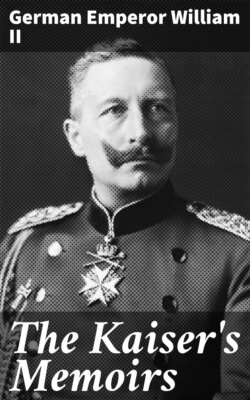Читать книгу The Kaiser's Memoirs - German Emperor William II - Страница 20
На сайте Литреса книга снята с продажи.
FURTHER CONFLICT WITH CHANCELLOR
ОглавлениеTable of Contents
The predicted opposition from Prince Bismarck was not long in coming. There was much trouble and fighting before I put through what I wanted, owing to the fact that some of the big industrial interests ranged themselves on the side of the Chancellor. The State Council met, presided over by me. At the opening session the Chancellor unexpectedly appeared. He made a speech in which he ironically criticized and disapproved the whole undertaking set in motion by me, and refused his co-operation. Thereupon he walked out of the room.
After his departure the strange scene had its effect on the assemblage. The fury and ruthlessness which the great Chancellor brought to the support of his own policy and against mine, based upon his absolute belief in the correctness of his own judgment, made a tremendous impression upon me and all those present. Nevertheless, it stood to reason that I was deeply hurt by what had occurred. The assemblage proceeded to take up its work again and turned out a wealth of material for the extension of that social legislation called into being by Emperor William the Great, which is the pride of Germany, evincing, as it does, a protective attitude toward the laboring classes such as is not to be found in any other land on earth.
Thereupon I decided to summon a general social congress. Prince Bismarck opposed this also. Switzerland was contemplating something similar, and had thought of convening a congress at Berne. Roth, the Swiss ambassador, hearing of my scheme, advised canceling the invitations to Berne and accepting an invitation to Berlin. What he wished occurred. Thanks to the generosity of Herr Roth, it was possible to convene the congress at Berlin. The material collected as a result of it was worked out and applied in the form of laws—only in Germany, however.
Later on I talked with Bismarck concerning his project of fighting the socialists, in case they resorted to revolutionary acts, with cannon and bayonets. I sought to convince him that it was out of the question for me, almost immediately after William the Great had closed his eyes after a blessed reign, to stain the first years of my Government with the blood of my own people. Bismarck was unmoved; he declared that he would assume responsibility for his actions; that all I need do was to leave the thing to him. I answered that I could not square such a course with my conscience and my responsibility before God, particularly as I knew perfectly well that conditions among the laboring classes were bad and must be bettered at all costs.
The conflict between the views of the Emperor and the Chancellor relative to the social question—i.e., the furtherance of the welfare of the laboring classes of the population, with participation therein by the state—was the real cause of the break between us, and caused a hostility toward me, lasting for years, on the part of Bismarck and a large part of the German nation that was devoted to him, especially of the official class.
This conflict between the Chancellor and me arose because of his belief that the social problem could be solved by severe measures and, if the worst came to the worst, by means of soldiers; not by following principles of general love for mankind or humanitarian nonsense which, he believed, he would have to adopt in conformity to my views.
